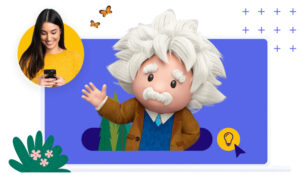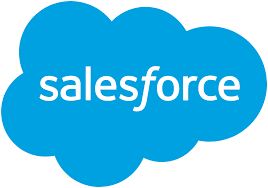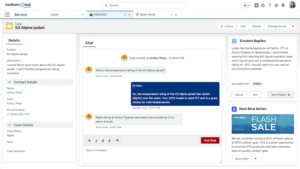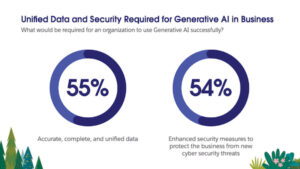
Salesforce Goes All-in on Generative AI with Einstein GPT, Integration with OpenAI

(Source: Salesforce)
At its TrailblazerDX developer conference in San Francisco, Salesforce has announced new releases, research, and funding centered around generative AI for its CRM platform.
Generative AI, specifically text generation via deep learning algorithms known as large language models, is the hottest topic in tech right now. This fascination was largely brought on by the public release of OpenAI’s ChatGPT chatbot, along with the ensuing scramble by Microsoft and Google to harness the power of large language models for everything from search engine companions to content creation.
Another exciting use case is AI assistants for customer service, and Salesforce has just unveiled Einstein GPT, a generative AI CRM technology that it says will deliver AI-created content across every sales, service, marketing, commerce, and IT interaction, across every Salesforce cloud, at hyperscale.
“The world is experiencing one of the most profound technological shifts with the rise of real-time technologies and generative AI. This comes at a pivotal moment as every company is focused on connecting with their customers in more intelligent, automated, and personalized ways,” said Salesforce CEO Marc Benioff in a statement.
 Einstein GPT and Data Cloud
Einstein GPT and Data Cloud
Einstein GPT is the next iteration of Salesforce Einstein, a suite of AI capabilities first released in 2016. As the first generation of AI for the Salesforce CRM, the company says Einstein currently delivers 215 billion AI-powered predictions across its Customer 360 platform per day. Einstein GPT will be integrated into every Salesforce cloud, as well as MuleSoft, Tableau, and Slack.
To ingest and unify customer data, Einstein GPT uses a blend of Salesforce’s proprietary AI models, real-time data from the Salesforce Data Cloud, publicly available data, and generative AI technologies from an open ecosystem of vetted partners. The Salesforce Data Cloud was announced during the company’s annual Dreamforce event in September 2022, and the company claims the database processes 100 billion records daily.
“Data Cloud is the fuel behind AI, and the engine is Einstein, so with our next generation AI, we’re able to deliver results that were never imagined possible across sales, service, marketing, commerce, and IT,” said Sanjna Parulekar, senior director of product marketing at Salesforce at a press event.
There are several components of the Einstein GPT release. Einstein GPT for Service can automatically generate agent chat replies to customers, as well as generate knowledge articles from past case notes. Einstein GPT for Sales can compose emails, schedule meetings, and prepare agents for their next customer interaction. Einstein GPT for Marketing is used for generating personalized content for current and prospective customers through email, mobile, web, and advertising. Einstein GPT for Slack provides customer insights in Slack such as summaries of sales opportunities or background research on accounts. Finally, there is Einstein GPT for Developers, a feature that uses Salesforce Research’s proprietary LLM and can generate code snippets, test cases, and comments.
Open AI Integration
The first ecosystem partner is OpenAI. This integration combines ChatGPT technology with Salesforce’s own AI models. Customers can connect their data to OpenAI’s AI models or choose an external model to use natural language prompts directly within the Salesforce CRM to generate adaptable content that updates according to changing customer information in real-time, asserts Salesforce.
When asked to what extent OpenAI’s technology is used, Jayesh Govindarajan, senior VP of AI/ML at Salesforce, said: “In essence, it’s a combination of natural language processing components for understanding and dialog design. We are going to be working with an ecosystem of partners at various levels. From a technical perspective, the GPT model is a large language model, and our goal is to work with our partners to build the layers on top. These layers that enable us to fine-tune the model, both on the prompt side and the data side, and use all the experts in the workflows to reinforce the model with human feedback tied to that context and task.”
One facet of the OpenAI integration is an app called ChatGPT for Slack, which Salesforce says can provide new AI-powered conversation summaries, research tools to learn about any topic or prospective account, and writing assistance to quickly draft messages in Slack.
“We’re excited to apply the power of OpenAI’s technology to CRM,” said Sam Altman, CEO of OpenAI. “This will allow more people to benefit from this technology, and it allows us to learn more about real-world usage, which is critical to the responsible development and deployment of AI—a belief that Salesforce shares with us.”
The Salesforce Approach to AI
As useful as they can be, a nagging problem with large language models is their tendency to deliver inaccurate or completely fabricated information. This is especially true for LLMs trained on huge datasets from the open internet, like ChatGPT. Salesforce says its specific approach can lend more confidence in the technology.
“Already we’re seeing large language models transform a number of disciplines, from drug discovery to language translation. Customer engagement is the next frontier. We believe that the value that generative AI can deliver to enterprises is enormous, but, like any new technology, generative AI is not without risks. A trusted approach rooted in business outcomes and ethical design is required,” said Clara Shih, CEO of service cloud at Salesforce, at a press event.

This screen shows how Einstein GPT for Service is integrated into the platform. (Source: Salesforce)
Salesforce lists a few elements of its approach, one of which is its open ecosystem where customers can bring their own models or choose from available pre-trained models. Another element is to remain relevant and focused on business outcomes, and feeding relevant, context-driven data to the models is key: “AI is only as valuable as its data and workflows. Today, hundreds of thousands of companies, and millions of employees at these companies, use Salesforce for their sales, service, marketing, commerce, and IT workflows. We’ve got the relevant context to really make the most out of generative AI,” said Shih.
Perhaps the most important element of a responsible AI approach is trust, Shih notes. “With great power comes great responsibility, and trust begins with data. Starting with our secure public cloud architecture, what we call Hyperforce, we can ensure secure data access, that personally identifiable information is protected, and that we’re complying with local and regional data residency requirements from a regulatory compliance perspective.”
She went on to explain that the company has also closely partnered its product and engineering teams with the Salesforce Office of Ethical and Humane Use of Technology to ensure there are built-in ethical guardrails guiding Einstein GPT. The guardrails are built around five principles the company has highlighted for responsible AI: accuracy, safety, honesty, empowerment, and sustainability.
One of Einstein GPT’s guardrails is the option to refine, supervise, and verify generated content: “We have designed into Einstein GPT a ‘human in the loop,’ which means that an employee, whether a seller, a marketing manager, or a customer service agent, has the final say and can make any edits on what generative AI creates as a draft, before hitting ‘send’ or ‘submit,’” said Shih. Additionally, any edits or refinements serve to reinforce the model over time.
$250 Million for Generative AI Research
As further evidence for the company’s enthusiasm for generative AI tech, Salesforce also announced a new Generative AI Fund from Salesforce Ventures, its global investment arm. Salesforce says this $250 million fund will invest in high-potential startups, bolster the ecosystem, and spark the development of responsible and trusted generative AI.
The fund will initially invest in four companies: Anthropic, an AI safety and research company; Cohere, an NLP company developing large language models; relationship management firm Hearth.AI; and personalized search engine You.com. Salesforce chose these companies for their ability to meaningfully transform application software using responsible development processes, the company said in a statement.
“Salesforce Ventures has been investing in high-potential enterprise technology businesses for more than a decade, and these initial investments from the fund in generative AI companies fit squarely into that strategy,” said John Somorjai, EVP corporate development and Salesforce Ventures at Salesforce.
“We’re excited to partner with Salesforce Ventures in this new era of responsible generative AI. With our suite of generative AI apps and products, business users can accomplish more – find people across social media, summarize complex topics, and code in different programming languages, create novel copy-right free images, and write blogs and marketing copy with AI,” said Richard Socher, founder and CEO of You.com.
AI Hopes and Concerns Uncovered in New Research
It seems that Salesforce is specifically addressing concerns about generative AI with its approach, as the results of a new survey of senior IT leaders showed that 59% believe generative AI outputs are inaccurate and 63% agree there is bias in these outputs.
Despite these reservations, 67% are prioritizing generative AI for their business within the next 18 months, and 33% are naming it as a top priority. Among those who believe the technology is over-hyped, 80% also believe AI will help them better serve customers.
However, 65% of those surveyed said they cannot justify implementing generative AI for the time being due to several barriers, including security risks (71%), lack of AI skills (66%), poor integration of AI with existing software stack (60%), and lack of a unified data strategy (59%).
The survey uncovered ways businesses can collaborate to rise above these barriers, as 82% of senior IT leaders said businesses should work together to improve the functionality of generative AI. Combining public and private data sources for better informed generative AI was named by 81% and 83% mentioned working collaboratively to ensure its ethical use.
Salesforce’s zest for generative AI comes at a time when the company is undergoing changes. The company recently hired actor Matthew McConaughey as a spokesman and “creative adviser,” to the tune of $10 million per year. At the same time, over 8,000 employees, or about 10% of the company’s workforce, were laid off in January with CEO Benioff saying the company had hired too many people during the pandemic. Salesforce is also facing increased pressure from its investors to tighten up. Four activist investment firms, Elliott Management, Starboard Value, ValueAct, and Inclusive Capital, are pushing the company to increase its profitability and efficiency while reducing spending.
Related Items:
We’re Leaving Data Potential on the Table, Salesforce Says
Companions, Not Replacements: Chatbots Will Not Succeed Search Engines Just Yet
Should Companies Disclose if Their Content Was Written by AI?
































